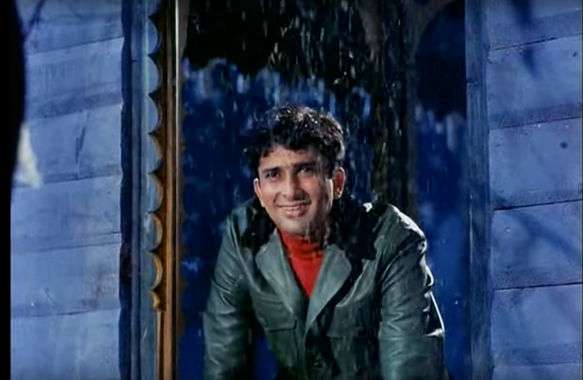
Handsome Shashi Kapoor gestures romantically with a pink rose in Sharmilee (1971).
Today we showcase the lovely lyrics and English translation of “Khilte Hai Gul Yahaan” from Sharmilee (1971) in honor of beloved actor Shashi Kapoor’s passing this week. “Khilte Hai Gul Yahaan” exemplifies quintessential Bollywood Shashi Kapoor, although film-goers will also remember another very different and talented side of the actor who thrived in independent and cross-over cinema. Born and raised in Bollywood royalty, Shashi Kapoor was 79 years old at the time of his death and had a prolific career of nearly 150 films.

Soft-lighting helps Rakhee glow in a glamour close-up from Sharmilee (1971).
Released in 1971, Sharmilee was a commercial and artistic success that launched both Shashi Kapoor and Rakhee’s star status in Bombay. Rakhee plays a dual role in the film–twin sisters, one shy and traditional and one outgoing and Westernized–who both fall for a handsome army officer played by Shashi Kapoor. Even at that time, Bollywood was no stranger to the cliche of the twin storyline–Shashi Kapoor himself had recently starred in his own twin-love-triangle-melodrama Haseena Maan Jayegi (1968). Can you guess which twin our hero ultimately ends up with? Is the name of the film not painfully obvious? I’ll give you another hint…in classic Bollywood, the traditional Indian way of life always wins!
Shashi Kapoor meets Rakhee (as vivacious twin) at a picturesque rest house in Kashmir on his way home from the army where she is traveling with a group of girl friends. Emboldened by Kishore Kumar’s confident vocals, Shashi Kapoor charms the party by crooning “Khilte Hai Gul Yahaan” and by his devastatingly gorgeous crooked smile. With music by S.D. Burman and the unparalleled Kashmiri countryside in the Winter, romance is all but inevitable. There’s also something undeniable about Bollywood actors in red turtlenecks that makes me feel all warm and fuzzy.

Shashi Kapoor gazes outward at the ethereal Kashmiri snowstorm in Sharmilee (1971).
Follow along with us below in our English translation to the lyrics of “Khilte Hai Gul Yahan” from Sharmilee (1971). The video of the song is here! Lata Mangeshkar reprises the song later in the film, but unfortunately, her version is sadder and far less popular.
Khilte Hain Gul Yahan Lyrics & English Translation:
Khilte hai.N gul yahaa.N, khilke bikharane ko
Here roses bloom, but they bloom only to have their petals disperse
Milte hai.N dil yahaa.N, mil ke bichhaDane ko
Here hearts meet, but they meet only to become separated
Khilte hai.N gul yahaa.N…
Here roses bloom…
Kal rahe na rahe, mausam yeh pyaar kaa
Tomorrow this season of love may or may not remain
Kal ruke na ruke, Dolaa bahaar kaa…
Tomorrow the swing of Spring may or may not come to a stop
Chaar pal mile jo aaj, pyaar mei.N guzaar de
Let us pass these four moments we meet in love
Khilte hai.N gul yahaa.N…
Here roses bloom…
Jhiilo.N ke honTho.N par, megho.N kaa raag hai
On the lips of the lakes is the melody of the clouds
Phuulo.N ke siine mei.N, ThanDii-ThanDii aag hai
In the hearts of the flowers is a cool flame
Dil ke aaiine.N mei.N tuu, yeh samaa utaar de
Let this atmosphere reflect upon the mirror of your heart
Khilte hai.N gul yahaa.N…
Here roses bloom…
Pyaasaa hai dil, sanam, pyaasii yeh raat hai
There is a yearning in my heart, my beloved, as is a yearning in the night
HonTho.N mei.N dabii-dabii koii miiThii baat hai
Sweet words lay silent on the lips
In lamho.N pe aaj tuu, har khushii nisaar de
Bestow every happiness on these moments today
Khilte hai.N gul yahaa.N…
Here roses bloom…
Glossary:
khilnaa: to bloom; gul: rose; yahaa.N: here; bikharanaa: to disperse; milnaa: to meet; dil: heart; bichhaDnaa: to become separated; kal: tomorrow (or yesterday, depending on context); mausam: season; pyaar: love; ruknaa: to stop; Dolaa: swing; bahaar: Spring; chaar: four; pal: moment; aaj: today; guzaarnaa: to pass; jhiilaa: lake, marsh; ho.NT: lips; meghaa: cloud; raagaa: melody, song; phuul: flowers; siinaa: chest, heart; ThanDii: cold; aag: flame; aaiinaa: mirror; samaa: atmosphere; utaarnaa: to alight, to descend; pyaasaa: thirsty, yearning; sanam: beloved; raat: night; dabii: hidden, silent; miiThii: sweet; baat: words, conversation; lamhaa: moment; har: every; khushii: happiness; nisaar: adornment, bestowment
Did you know that snow is actually extremely difficult to capture on film? Not only could filmmakers not wait around patiently for an actual snowstorm to get their shot, but snow is so fine and iridescent, that traditional film cameras could rarely pick it up. Yesteryear filmmakers often sprayed everything from marble dust, foamite (the fluffy stuff that comes out of fire extinguishers), to cornflakes painted white in order to recreate the magic of a snowstorm. You’ll see what I mean if you take a real close look when Shashi grabs some “snow” from the window sill to throw at the girls in the cabin!

A snowy view of my parent’s backyard. It may not be Kashmir, but it ain’t bad! And no, that fluff in the air isn’t cornflakes.
This song translation was requested by fan Swami. Thank you for the excellent request!
If you can’t get enough of Shashi Kapoor this week (or in general), check out another romantic hit “Likhe Jo Khat Tujhe” from the film Kanyadaan (1968). It’s one of my personal favorite songs of all time!
– Mrs. 55










